
- catfishboy
- Administrator
 Offline
Offline 
- Registered: 8/01/2017
- Posts: 6,868
The Top 4 recruiting misses in Ole Miss football history
The Top 4 recruiting misses in Ole Miss football history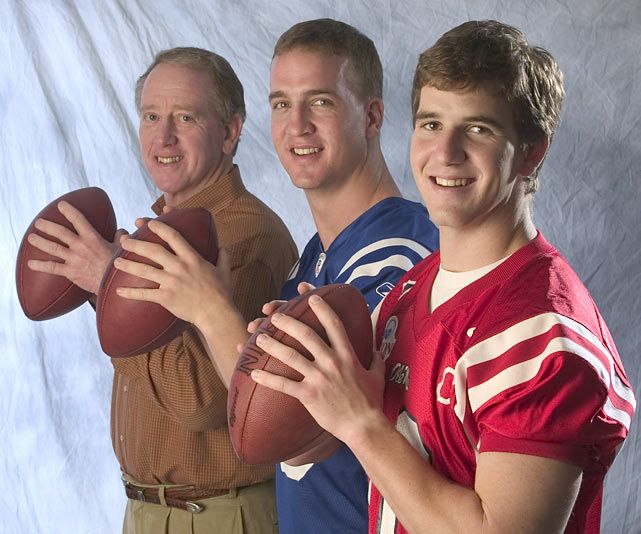
Ole Miss football has had no shortage of What If? moments in its long, and oftentimes torturous, history.
Ole Miss has certainly dealt with more than its fair share of heartbreak, from on-the-field catastrophe (fourth-and-25, Laquon Treadwell’s horrific injury and touchdown reversal against Auburn, and the de facto SEC West title game against LSU) to crippling recruiting misses (more on that in a moment).
They’re snapshots in time that, had a few of the outcomes turned out differently, could have charted a far different course for the Rebels, from a possible appearance in the College Football Playoff to, at the very least, their first-ever trip to Atlanta for the SEC title game.
Here, we take a deep-dive look into the Top 4 (well, really, five) all-time recruiting misses.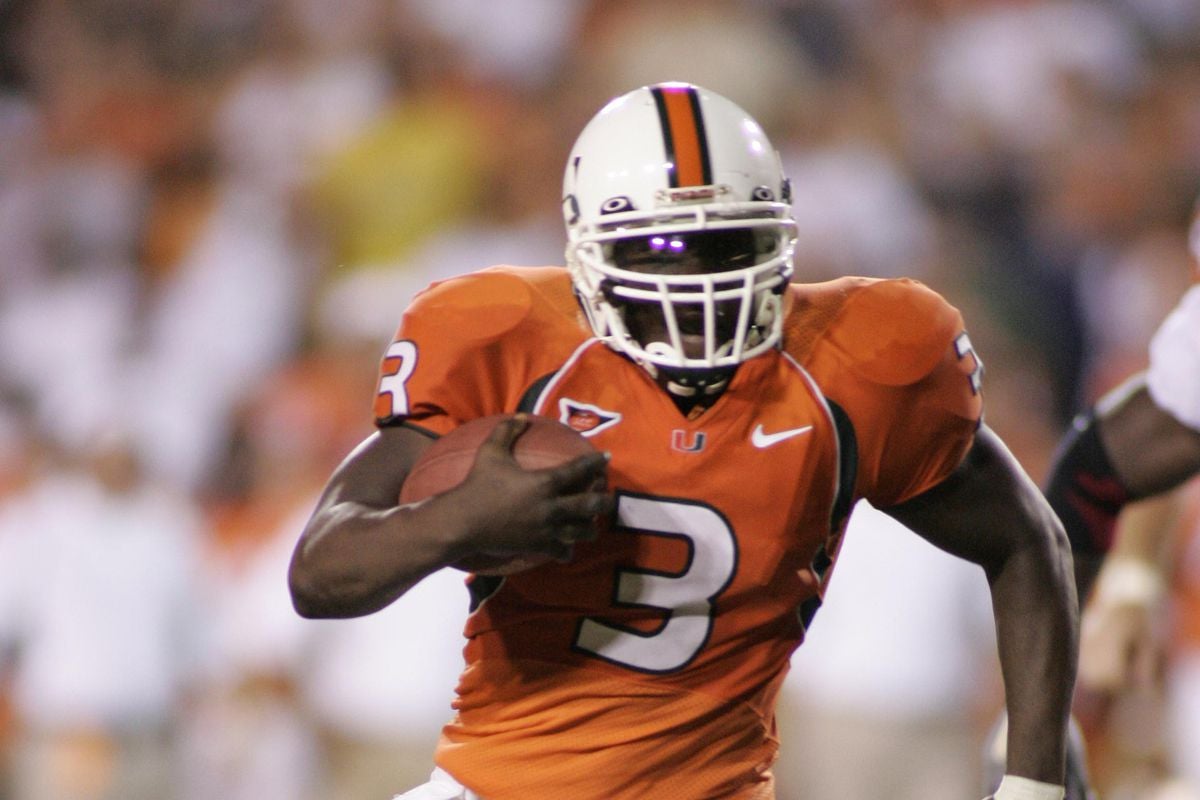
No. 4 FRANK GORE/ROSCOE PARRISH | FOUR-STAR RB/FOUR-STAR WR
What Happened: Imagine an Ole Miss backfield featuring Eli Manning and Frank Gore, two all-time NFL greats, as well as a group of wide receivers led by Roscoe Parrish, who spent seven professional seasons with the Buffalo Bills and one with the Tampa Bay Buccaneers, recording 134 catches for 1,502 yards and seven touchdowns in 90 games.
It almost happened.
Manning played a key role in nearly getting Gore across the finish line for the Rebels. Arguably the greatest quarterback in Ole Miss history, Manning served as Gore’s player host for the latter’s official visit in 2000. Gore, at the time, was committed to the Rebels, as was Parrish, the product of a year’s worth of work from then-Ole Miss assistant Mike MacIntyre. MacIntyre, who would later return to Ole Miss to serve as defensive coordinator for the 2019 season, was primarily responsible for clearing a path for the Miami (Fla.) products to become academically eligible. Despite his efforts, though, and seemingly at the last minute, Gore and Parrish both flipped to the Hurricanes.
Here’s how Manning explained it, in an interview nine years ago: “He committed. I thought I had a good visit and I took care of him. On signing day, we couldn’t find him. Miami had him hidden or something.”
Gore said his decision to spurn Ole Miss was due to the declining health of his mother. But the Miami coaching staff, he said, did a good job of persuading him, too.
“I was looking at wanting to play early,” he said, in a previous interview with the SFGate. “I thought going to Ole Miss I had a chance to start. But, you know, I had my mom situation. And (Miami) coach C.J. (Curtis Johnson), the receiver coach from New Orleans, and coach Kiel (?), they really recruited me good. They were like, ‘You want to be the best? Then come play with the best. I know you’re not scared of competing. Come to Miami.’”
Gore, on Tuesday, signed a one-year contract with the New York Jets to continue his 16-year NFL career. He’s the third-leading rusher in NFL history. Manning, in January, retired from the NFL after 16 seasons leading the New York Giants. A former No. 1 overall NFL Draft selection, Manning is a two-time Super Bowl champion and Super Bowl MVP. He ranks seventh in league history in passing yards (57,023), passing touchdowns (366), starts (234) and completions (4.895). He also holds multiple Giants franchise records, including highest completion percentage (60.3). Ole Miss now rosters Parrish’s distant cousin, four-star running back Henry Parrish, who signed with the Rebels in the 2020 class.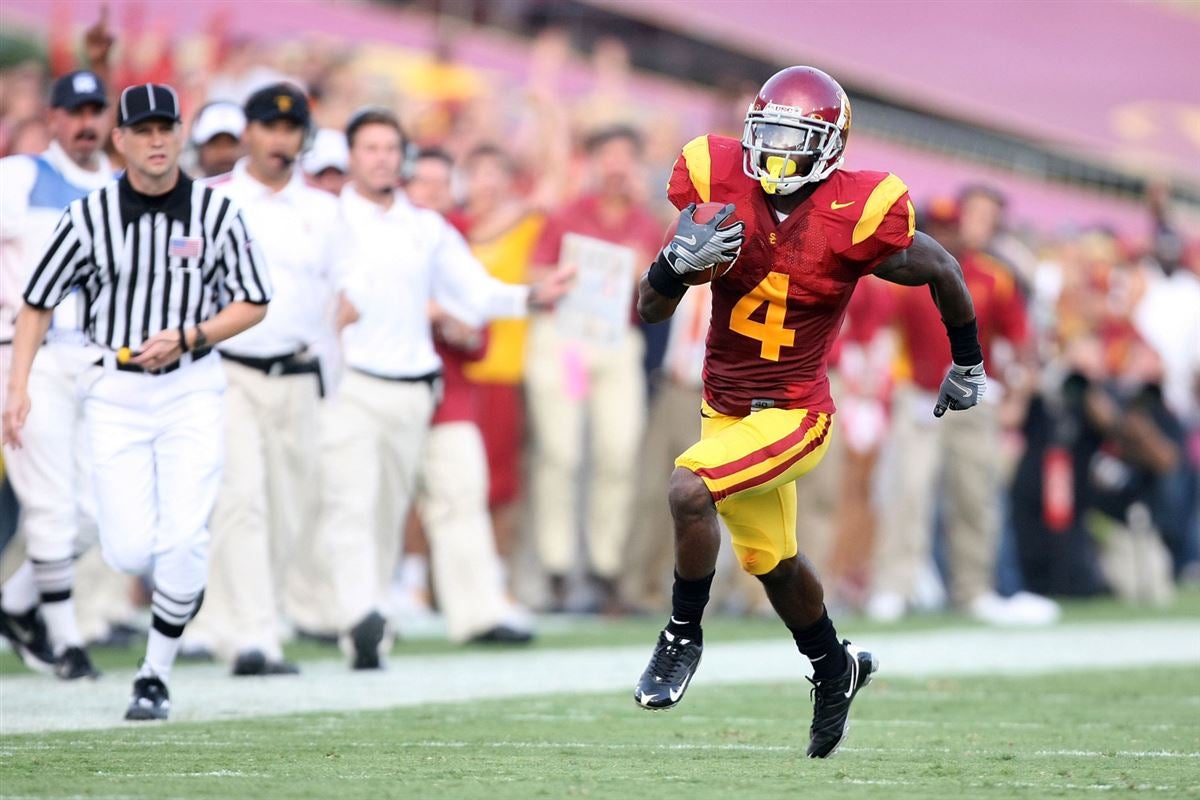
No. 3 JOE MCKNIGHT | FIVE-STAR RUNNING BACK
What Happened: Most everyone remembers the circus-like recruitment of the former five-star running back, who, in 2016, tragically passed away after he was shot during a road-rage incident in the New Orleans suburb of Terrytown.
As detailed by Bruce Feldman in his popular book, Meat Market, which covered, in detail, the recruiting efforts by Ed Orgeron’s Ole Miss coaching staff in the late-2000s, Ole Miss had far greater needs than running back in its 2007 class. The Rebels, fresh off a three-win season, were in dire need of offensive and defensive linemen, a quarterback, safeties and cornerbacks. But after lengthy film study and an impassioned argument in his favor by then-Rebel running backs coach Frank Wilson, a New Orleans prep coaching legend, McKnight, a star at two positions at John Curtis Christian in the Big Easy, quickly ascended to priority No. 1. The Rebels had already offered McKnight when he was a freshman in high school.
According to Feldman, Wilson had heard stories about McKnight since McKnight was a third-grader. He was determined to land him, even going so far as to infamously guarantee the Rebels would sign him when pressed in a recruiting staff meeting in May of 2006. Orgeron was hell-bent on turning Ole Miss into Southern Cal-lite, fashioning his teams after the USC championship teams of 2003 and 2004, when he served as associate head coach. He viewed McKnight as his Reggie Bush, a Heisman-Trophy-winning running back for the Trojans. The Rebels envisioned McKnight pairing with BenJarvus Green-Ellis, another NOLA native, to form a one-two punch akin to all-time Ole Miss great Deuce McAllister and Bush with the 2007 New Orleans Saints. The duo led the Saints to the NFC Championship Game that year.
In the end, McKnight chose from Ole Miss, USC and LSU. Ole Miss got his first official visit in January, and he was hosted by Green-Ellis and Kentrell Lockett. Lockett was considered the ace player host, always linked up with the top-ranked and most-coveted official visitor.
Alas, the Rebels came up short. Orgeron, for his part, helped push McKnight to USC. The Trojans initially recruited McKnight as a cornerback, but a phone call from Orgeron to then-USC head coach Pete Carroll turned the tide and kept McKnight away from LSU. The way Orgeron saw it, if Ole Miss couldn’t get him, the next-best option was keeping him away from an SEC West rival. Of course, 13 years later, Orgeron would lead LSU to a national championship as Tiger head coach.
But who knows, had Orgeron landed McKnight, ranked by the industry-generated 247Sports Composite as a five-star prospect, the No. 1 player in the country for his class and the No. 12 recruit all-time, maybe his Ole Miss tenure turns out much differently. McKnight would have brought immediate national credibility, not to mention another playmaker to Oxford to join Dexter McCluster, Mike Wallace, Jevan Snead and others. Remember, in the 2006 season, Ole Miss lost three games to Top 20 teams by a touchdown or less.
All Ole Miss had to show for its pursuit of McKnight was Colby Arceneaux, a lightly-recruited, undersized defensive back who’d been friends with McKnight since grade school.
Yeesh.
No. 2 CHRIS JONES | FIVE-STAR DEFENSIVE TACKLE
What Happened: In what is and always will be one of the wildest and most contentious recruitments the state of Mississippi has ever seen, Chris Jones went all the way to National Signing Day in 2013 torn between his choice of in-state rivals Mississippi State and Ole Miss.
Former Ole Miss head coach Hugh Freeze described Jones as the recruit that got away, and for good reason.
Jones was a hidden gem when he committed to the Bulldogs in June of 2012. He was ranked as a middle-of-the-pack three-star recruit and held only a handful of offers, due, in part, to some in his inner circle shielding him from college scouts as cover for Mississippi State. He blew up in the closing months of 2012 following a dominant senior season and head-turning performances in the Mississippi-Alabama All-Star (eight tackles, one sack, three tackles for loss and game MVP) and Under Armour All-Star (three tackles, one sack, one tackle for loss, two forced fumbles) games.
247Sports went so far as to give Jones, in mid-December, a five-star designation and rank him as its No. 2 overall player behind only Robert Nkemdiche, a fellow defensive tackle who signed with Ole Miss in a class that finished ranked eighth nationally and fourth in the SEC. In short order, Jones began to waver on his pledge, and his recruitment devolved into a battle of sources between Ole Miss and Mississippi State beat writers.
Jones visited Ole Miss twice, and kept in constant contact with Freeze, in the week leading up to signing day. Actually, as Freeze would later claim, the two maintained a relationship throughout Jones’ career at Mississippi State. Weird.
Alabama, Auburn and Florida were involved as well, but Ole Miss turned out to be Mississippi State’s main competition. He was supposed to visit the Bulldogs the weekend of Jan. 25. He ended up at Ole Miss instead, in a weekend that played out all over social media. Laquon Treadwell, in particular, made a Twitter show of his recruiting efforts, including those aimed at Jones, with a series of tweets from the Square and elsewhere. He even claimed responsibility for the commitment of Quincy Adeboyejo. Nkemdiche and Laremy Tunsil were in town, too, and the collection of top prospects set the state’s online recruiting community on fire when they came together for a photo shoot in Ole Miss jerseys in the now-named Manning Center.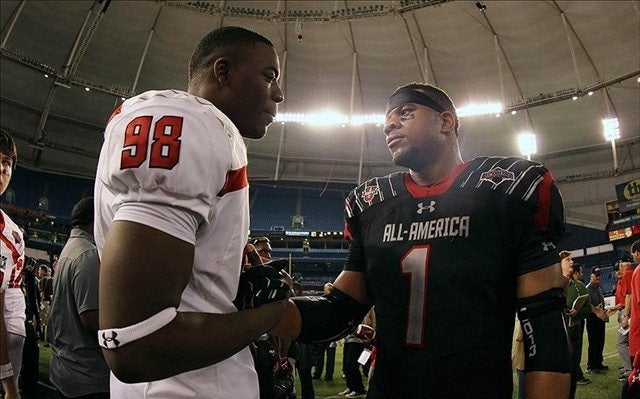
Jones showed back up in Oxford the Saturday before signing day on Feb. 6, though a majority of Mississippi State fans, as well as its “reporters,” swore up and down he had made no such trip. Then pictures popped up of Jones at a fraternity party on campus with Ole Miss football players. And on the Square. On and on. To their credit, Jones, via text to those MSU-affiliated writers, denied he was at Ole Miss, not to mention the Bulldogs earned final bragging rights considering he ultimately cast his lot with the Bulldogs. But it was close; much, much closer than many would lead fans to believe.
Jones told the Clarion-Ledger the morning of his announcement he was “80 percent sure” he was headed to Ole Miss. The addition of Jones would have likely placed the Ole Miss recruiting haul in the Top 3 in the country. Even more, the Rebels would have added another weapon to a 2014 defense that surrendered the fewest points in all of college football. They were Top 10 in forced turnovers and tackles for loss. A defensive line with Nkemdiche and Jones? Scary.
Jones has since gone on to become one of the most dominant interior linemen in the NFL for the defending Super Bowl champion Kansas City Chiefs, further proving he was worth the fight.
NO. 1 PEYTON MANNING | QUARTERBACK
What Happened: No other recruiting miss comes close.
Peyton Manning is the eldest son of Archie, arguably the greatest player in Ole Miss history, whose No. 18 is one of only two numbers retired by the school and acts as the speed limit on campus. The elder Manning was Ole Miss’ starting QB for three seasons, throwing for 4,753 yards, 31 touchdowns and 40 interceptions over his college career. He added 823 rushing yards. Manning scored 14 touchdowns in 1969, the same year he was named All-SEC for the first time. He was an All-SEC selection in 1970 as well. He finished fourth in the Heisman Trophy voting in 1969 and third in 1970 and was inducted into the College Football Hall of Fame in 1989.
Peyton, the second of his three football-playing sons and a member of the recruiting class of 1994, was supposed to follow in his footsteps.
Most know what happened. First, Ole Miss was mired in a fight with the NCAA that resulted in harsh sanctions (two-year postseason ban, no televised games, scholarship reductions) and the dismissal of head coach Billy Brewer. But often overlooked, and rarely acknowledged as the deciding factor in Peyton ending up at Tennessee, was what happened to his older brother, Cooper, a Rebel wide receiver.
Peyton and Cooper had aspirations of playing together in college. However, Cooper, himself a highly-ranked recruit, had his football career come to a sudden end because of a spinal stenosis diagnosis his freshman year. With Cooper out of the fold, and with uncertainty surrounding the program, there was nothing holding Peyton to Ole Miss.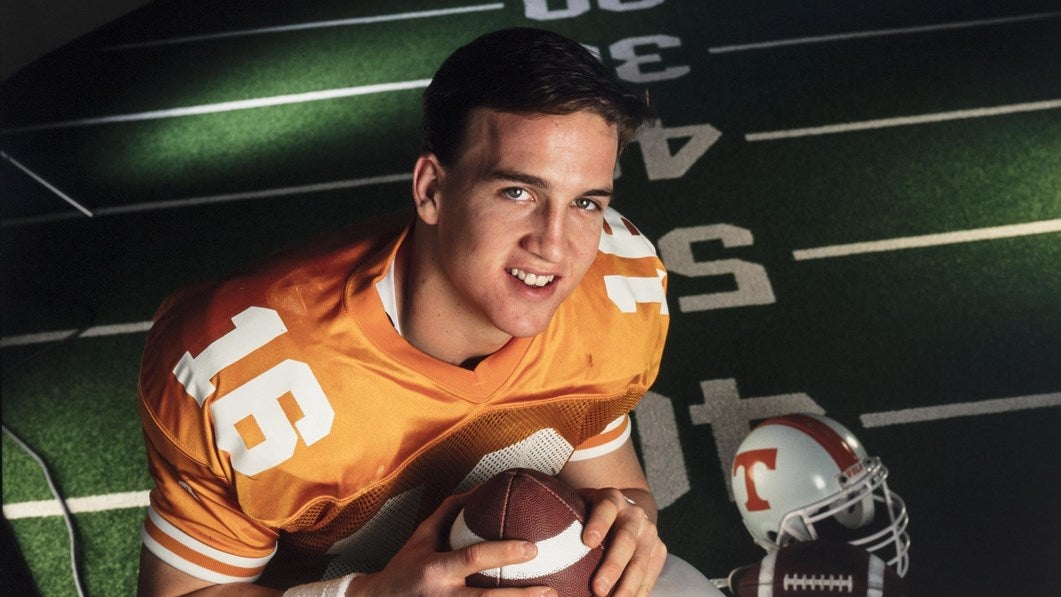
There are those who still believe, almost two decades later, had Cooper been OK, Peyton would have ended up as a Rebel, stepping into the shoes of the father he idolized. Archie and his wife, Olivia, were Ole Miss legends. Olivia was an Ole Miss homecoming queen.
Instead, Peyton went with Tennessee over Ole Miss, Michigan and Florida. According to Archie, even when Peyton decided against the Rebels, Ole Miss still played a role in where he ended up.
“I thought the Ole Miss thing was weighing really heavy on him, and he’s thinking, ‘Alright, if I don’t go to Ole Miss, I don’t want to play against Ole Miss,” he said, in a previous interview with MassLive.com. “I’m getting away from the whole thing.’ And I really think (Michigan) was his getaway. At some point, the (Tennessee) coaches convinced him or he convinced himself that by going to the other side of the conference, he wouldn’t have to play (Ole Miss) every year.”
Peyton Manning wrapped his Tennessee career with 11,201 passing yards, 89 touchdowns and just about every passing record in Volunteer history. He guided them to their first SEC title in the divisional age. He was the No. 1 overall selection of the Indianapolis Colts in the 1998 NFL Draft. He played 18 seasons with the Colts and Denver Broncos, becoming one of the greatest quarterbacks in league history. He’ll go into the Pro Football Hall of Fame on the first ballot when he becomes eligible for the first time in 2021.
Without Manning, Tennessee likely has two fewer SEC titles and doesn’t win its first-ever BCS national championship. David Cutcliffe probably doesn’t end up at Ole Miss as the replacement for Tommy Tubberville in 1998. Eli arrives a few years later to carry on the legacy of his father and brother, who would have certainly done better than the 23-22 record Ole Miss produced while he was at Tennessee. The Rebels would have assuredly been on a larger stage than the Motor City Bowl in 1997, the year the Rebels finally returned to the postseason. They would have been nationally-relevant in the 1990s; an SEC West contender, their recruiting profile dramatically boosted to, possibly, a national footprint. Maybe the step up in talent helps out Eli, the crown jewel of the 1999 class, and gets Ole Miss over the hump in his 10-win senior season. The Rebels are one game better than LSU and reach Atlanta, forever wiping away the ugly goose egg as far as SEC title game appearances.
Chuck has told this story before, but one last time, for emphasis: The morning Peyton opted for Tennessee, and after Peyton had called the Volunteer coaches, Chuck’s phone rang. It was Peyton, at 6:05 a.m., breaking the bad news that Chuck would later admit landed like the worst of all punches to the gut. Chuck could have been any Ole Miss fan that day. Peyton was the chosen one.
All these years later, he still is.
Honorable Mention: Lance Alworth, Cam Akers, Fletcher Cox, DeAngelo Williams
SOURCE: Garrett, Ben. "The Top 4 recruiting misses in Ole Miss football history." OMSpirit - 247Sports.com, 5 May 2020,
(c) All rights reserved. Content may not be copied, transposed, or used in any manner or form without expressed written permission of user.

 1 of 1
1 of 1